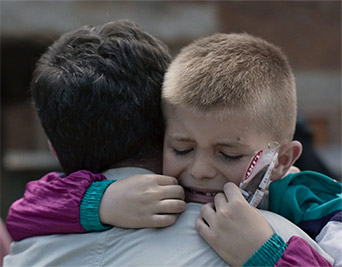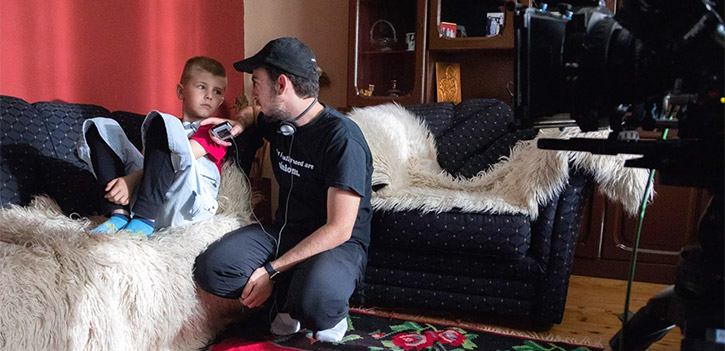
A still from the film Bini courtesy of Tilia Entertainment.
Congratulations to Erblin Nushi for winning the Jury Award for Outstanding Local Filmmaker for his film BINI at DC Shorts Film Festival. You can read the interview with Erblin in the Washingtonian, here:
Erblin Nushi was six years old when Serbian soldiers came to his hometown of Peja, Kosovo and packed his parents, sister, and him into a truck to the Albanian border. In Albania, the refugee family found safety until the end of the Kosovo War, when they were able to return to a changed home.
Now 26, Nushi has turned his experience of that day into a 20-minute film Bini, which he shot over five days in Kosovo. Originally his senior thesis project at George Mason University, the film—named after his childhood nickname—was selected as a finalist for the Student Academy Awards and received the DC Shorts Film Festival jury prize for Best Local DMV Film. Nushi chatted with Washingtonian about recreating the day in Kosovo 19 years ago.
Can you walk me through that day?
For me, it was just like any other day. At first, it was pretty normal because the next day was supposed to be a holiday and we did shopping and got candy. That’s why I have the reference to the candy in the film now. It was really strange because I didn’t know what was happening. I was being protected by my parents. The whole time I was told we were going away for something and I didn’t know where we went until after. Everything went crazy. I just remember a lot of people in the streets and everybody leaving. It’s a very big blur for me because it was so long ago. I was six. But I have flashbacks of us being crammed into this truck and not being able to breathe and people screaming.
What was it like translating that into a film?
It was a really interesting thing because I was so young [at the time and] I was not able to comprehend what was happening. When I wrote the story, I knew the extent of the trauma that I had gone through, but I wasn’t really experiencing it or any PTSD until we were actually filming. When we were on set, recreating all of that was bringing back those memories. It was day three when it really hit me. I was like, ‘Oh my god, I really lived through this.’ It’s harder. For me, not being aware was a little bit easier.
How did you come to terms with the trauma?
All of this is a healing processes for me right now. As a country, we moved on really fast from the war and we never really talked about it. We were just happy to move on, create new lives, and have our own country for once. The people who lived through [it] don’t talk about it. My family never spoke about the day. I had these flashbacks and didn’t know how to process them because no one spoke about them. When I made the film and talked about it, I didn’t feel alone anymore.
[Behind the scenes, Erblin Nushi chats with the young actor who plays Nushi in the film. Photograph courtesy of Tilia Entertainment.]
Behind the scenes, Nushi chats with the young actor who plays him in the film. Photograph courtesy of Tilia Entertainment.
Why make it now?
I wanted to tell this story because of everything that’s happening in the current day with the refugee crisis and children being separated from their families. Being a victim and having gone through it myself, I don’t wish it on anybody. Seeing the stuff happening around the world now, it breaks my heart. I want to do something about it. This was the only way that I found [I could] say something and give a voice to those people through my art. The film was for all the lives that were lost in Kosovo, to memorialize them and give them a voice, because they were pretty much forgotten. I usually make films that have social justice issues because I love creating art, but for me—to be satisfied with it—it has to have some meaning and message.
What’s next for you now that you’ve graduated from George Mason?
I’m working on a couple of projects. Every filmmaker’s goal is to make a feature film. I’m writing Bini as a feature. I’m expanding it, because there was a lot that didn’t make it into the short. When I was writing the script for the short film, I interviewed a bunch of people about the day that it happened and how their experience was. It’s so different from one person to the other. How I saw it at 6 years old was completely different from someone who was 15, and 30 and 40. The impact was just so different, and that’s so interesting to me.
Bini was screened during the DC Shorts Film Festival in September, at Miracle Theater, Washington, D.C.
This interview has been edited and condensed.

Behind the scenes, Nushi chats with the young actor who plays him in the film. Photograph courtesy of Tilia Entertainment.
